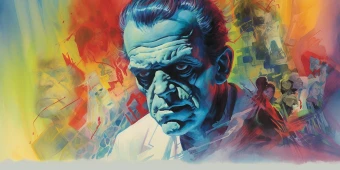by F. Scott Fitzgerald


The Great Gatsby: Introduction

The Great Gatsby, written by F. Scott Fitzgerald and published in 1925, is a novel that has become a classic of American literature. Set in the roaring twenties, it tells the story of Jay Gatsby, a wealthy and mysterious socialite who becomes obsessed with the idea of winning back his former lover, Daisy Buchanan, who is now married to another man.
The novel is not only a portrait of the excesses and moral decay of the Jazz Era, but also a critique of the American Dream and the hollow promise of social mobility. In this sense, The Great Gatsby is a deeply American novel that captures the zeitgeist of a particular historical moment while also speaking to universal themes and concerns.
Historical Context
The Great Gatsby is set in 1922, during the height of the Roaring Twenties, a time of great economic prosperity and social change in the United States. The decade saw a boom in industry and consumerism, as well as the emergence of a new youth culture that embraced jazz music, dancing, and sexual liberation. The novel takes place in New York City and on Long Island, where the rich and fashionable spent their summers in luxurious mansions and parties.
However, the excesses of the 1920s also had a darker side. The era was marked by widespread corruption, organized crime, and a breakdown of traditional values. The Great Gatsby reflects this dichotomy, depicting a world of wealth, glamour, and decadence that is ultimately hollow and unsatisfying.
Reception
Upon its publication, The Great Gatsby was not an immediate commercial success, selling only 20,000 copies in its first year. However, it was widely praised by literary critics, who recognized Fitzgerald's skillful use of language, complex characterizations, and sharp social commentary.
Over time, The Great Gatsby has become one of the most celebrated works of American literature, and it is now considered a classic of the genre. The novel has been adapted into numerous films, plays, and operas, and it continues to be studied and analyzed by scholars around the world as well as used by students to write essays about The Great Gatsby for their classes.
Impact and Relevance
The Great Gatsby has had a profound impact on American culture and society, influencing not only literature but also fashion, music, and film. The novel has been cited as an inspiration for the Art Deco style that dominated the 1920s and 1930s, as well as the Jazz Age music of Duke Ellington and Louis Armstrong.
In terms of literature, The Great Gatsby is often cited as an example of the modernist movement, which sought to break with traditional narrative structures and explore new forms of expression. The novel's fragmented narrative, use of symbolism, and exploration of psychological themes all mark it as a work of modernist literature.
Beyond its artistic and cultural impact, The Great Gatsby also remains relevant today as a commentary on American society and its values. The novel's critique of the American Dream and the notion of social mobility still resonate with readers, as does its exploration of the corrupting influence of wealth and power.
Moreover, the character of Jay Gatsby himself has become an iconic figure in American popular culture, representing both the allure and the emptiness of the American Dream. Gatsby's tragic story of unrequited love and social aspiration continues to captivate readers and viewers alike, serving as a cautionary tale about the dangers of pursuing happiness and success at any cost.
The Great Gatsby is a literary masterpiece that has left an indelible mark on American culture and society. Through its vivid characters, evocative settings, and incisive social commentary, the novel captures both the excitement and the disillusionment of the Roaring Twenties while also exploring universal themes and concerns.

- Instructions Followed To The Letter
- Deadlines Met At Every Stage
- Unique And Plagiarism Free


 Frankenstein
Frankenstein
 The Odyssey
The Odyssey
 The Yellow Wallpaper
The Yellow Wallpaper